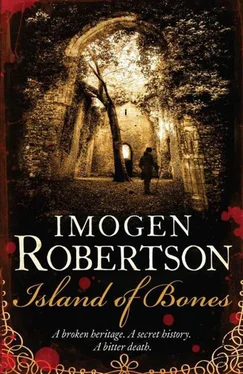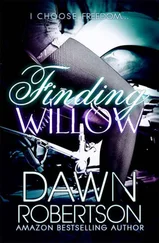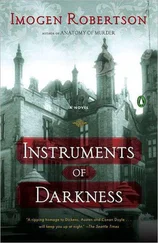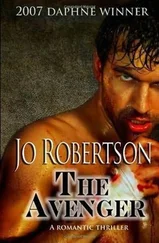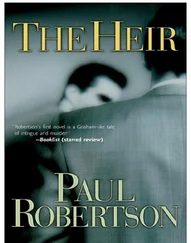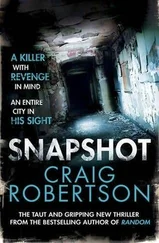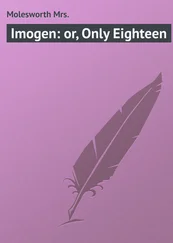Imogen Robertson - Island of Bones
Здесь есть возможность читать онлайн «Imogen Robertson - Island of Bones» весь текст электронной книги совершенно бесплатно (целиком полную версию без сокращений). В некоторых случаях можно слушать аудио, скачать через торрент в формате fb2 и присутствует краткое содержание. Год выпуска: 2011, ISBN: 2011, Издательство: Hachette Littlehampton, Жанр: Исторический детектив, на английском языке. Описание произведения, (предисловие) а так же отзывы посетителей доступны на портале библиотеки ЛибКат.
- Название:Island of Bones
- Автор:
- Издательство:Hachette Littlehampton
- Жанр:
- Год:2011
- ISBN:9780755372058
- Рейтинг книги:3 / 5. Голосов: 1
-
Избранное:Добавить в избранное
- Отзывы:
-
Ваша оценка:
- 60
- 1
- 2
- 3
- 4
- 5
Island of Bones: краткое содержание, описание и аннотация
Предлагаем к чтению аннотацию, описание, краткое содержание или предисловие (зависит от того, что написал сам автор книги «Island of Bones»). Если вы не нашли необходимую информацию о книге — напишите в комментариях, мы постараемся отыскать её.
Island of Bones — читать онлайн бесплатно полную книгу (весь текст) целиком
Ниже представлен текст книги, разбитый по страницам. Система сохранения места последней прочитанной страницы, позволяет с удобством читать онлайн бесплатно книгу «Island of Bones», без необходимости каждый раз заново искать на чём Вы остановились. Поставьте закладку, и сможете в любой момент перейти на страницу, на которой закончили чтение.
Интервал:
Закладка:
His tutor smiled, deciding that further discussions on the Rebellions would have to wait. He was a young man, modest and sober in his habits and manners, but still able to share something of Stephen’s pleasure at the landscape. He closed his guide.
‘It looks like the country for them, does it not? We shall have to search for them.’
Crowther had not enjoyed the journey so completely as Stephen, but then he did not think to. Any suggestion that he might delight in the variety or be discomforted by the quality of his accommodation would be met with incomprehension. He had what was sufficient to his needs and there his interest in his material comforts ended. He found it perfectly possible to read as the carriage surged or jolted forward according to the state of the roads and so he passed his time reasonably contented. However, on the morning that they began their final approach to Keswick he found his book no longer held him. He closed it to find Mrs Westerman observing him.
‘Crowther, when did you last visit this town?’
He chose to look out of the window as he replied, ‘In 1751, madam. The estate was sold in that year to the current owner, Mr Briggs; I came to sign a number of documents and provide for the staff of the estate in my father’s name, though I never met the gentleman. The sale was made within three months of my brother’s execution. He murdered our father in the late autumn of 1750, and was hanged in the February of the following year.’
The events of Crowther’s past were seldom spoken of between them. Crowther had used the wealth he had inherited to bury his personal history deeply, and turn his youthful interest in anatomy into expertise. He had taken his current name and studied under it in Germany, Italy and London, withdrawing finally into Sussex, his wish to avoid any larger world and dedicate his time to the mysteries of how life exists in the actuality of flesh, bone and brain. His involvement with Mrs Westerman and the corpse she had found on the edges of her estate in the summer of 1780 had pulled him from his candlelit study into the public glare of day, and though his bloody heritage had been discovered and exposed, still he kept the name and manners of Gabriel Crowther, the man he had made himself, a man without connections, a free man. It was an uneasy accommodation, and his former name, his former title and place in society could still itch at him from time to time, or rear up growling. No doubt they would do so even more fiercely here.
‘And what became of your sister at that time, Crowther?’ Harriet said. Crowther looked at the woman opposite him for a moment. Widowhood had not altered her as much as he had feared it might. His sister would be some ten years her senior, he supposed, and might have already made that transition from womanhood to matron that had yet to begin with Harriet.
His sister. She was an infant the age of Anne Westerman when he had left Keswick for his schooling. His visits to the family home had been infrequent from that point. They had met as strangers at the funeral of their mother early in 1750, and when, on his father’s murder, a family of Irish cousins had offered to give her a home, he had accepted the proposal at once and with relief. He had thought to write after their brother’s death on the scaffold but had abandoned the attempt. She became part of a past he wished nothing of. When his lawyers told him of her marriage, the birth of her son and her separation from her husband he had instructed them to make the proper financial arrangements, and there he felt his obligations ended. Her son would be something of Rachel’s age now, and was heir to his wealth and rejected title as well as those the young man would inherit through his own father, a man of minor nobility in one of the Prussian Courts. Crowther wondered, if he had known a Harriet Westerman at that early stage in his life, would events have unfolded differently, but at that time there had been no person so ready, like her, to ignore his wealth, his habit of chilled command as to question him. He had done what best suited him, and never thought of doing otherwise.
‘She went to some of my mother’s family in Ireland. I have not seen her since then. I told my lawyers not to inform her as to either the new name I took at that time, or my address, though I do not think she ever enquired.’
Harriet turned her ring. ‘I am interested to meet her, Crowther. Are you?’
He looked out of the window. ‘I do not know, Mrs Westerman.’
She waited for him to continue, but when he did not, said brightly, ‘So, sir. We have known each other three years and waded through a great deal of blood together. Would you think me impertinent to ask you for your given name?’
He smiled. ‘I was born Charles William Gabriel Penhaligon, and at the moment of my brother’s hanging became the Third Baron of Keswick.’
Mrs Westerman considered a moment, then shrugged and said, ‘I think we are reaching the outskirts of the town, my lord.’
The little town of Keswick was becoming accustomed to the elegant coaches of strangers appearing in its midst. Since it was founded it had known times of prosperity and poverty. When the hills were discovered to be rich sources of metals in Henry and Elizabeth’s day, the inhabitants had found their numbers swelled by German prospectors, and forges and mills had crowded round the rivers. When the mines began to weaken, these buildings had been left to rot and the population had dwindled once more, returning to the ancient agricultural practices of the region while Keswick had hunkered down to wait for better times.
Now the fells and hills were proving to be a source of wealth once more, though in a different fashion. Since the poet Gray’s account of his time in the area, the curious had begun to find their way to the town over the improving roads, wishing to see for themselves the landscape of which he had written in such high style. Other descriptions of the area had appeared from time to time, and nowadays few visitors arrived to take rooms at the Royal Oak or Queen’s Head without Mr West’s guide to the area in one hand, and a Claude glass in the other, eager to be awed by the scenery. The natives of the area were pleased to show off their home and take the guineas of these romantic travellers, so had gained a reputation as generous and friendly hosts. Many had become adept at moulding their histories to the inclinations of their individual guests. To some they pointed out the peaks; to others they spoke of the bogles, fairy people, lost treasures and giants; to others they showed druidical stones and sites of ancient castles built to defend against raids from the borders. In this way, what had been earlier in the century a rather poor little town dreaming of former days of glory had begun to thrive again and take the pleasures of its visitors more seriously with a variety of entertainment and new buildings.
As the carriages passed through the main square, Mr Oliver Askew, one of the prime instigators of these improvements, watched them with interest from the front door of his new museum. The occupants had money enough, he could see that by the comfort in which they travelled, but the equipage was rolling past the better inns towards Portinscale and Silverside Hall. More guests for Mrs Briggs, perhaps. He thought of the skeleton recently discovered in the tomb on St Herbert’s Island and rubbed his hands. He had commissioned and received a dramatic, if purely imaginative, sketch of the grisly discovery and was keen to hang it, but he was nervous of the Vizegrafin’s reaction to her portrayal. She had heard of his display of pamphlets, cuttings, sketches and curios related to the death of her father and her brother’s execution within a day of her arrival at Silverside, and had sent a note to ask that they be removed from display for the length of her stay. Mr Askew was a naturally pugnacious man, and liked to boast about his habits of plain speaking with manly pride, yet something in the tone of the note had snapped his will like a reed and the display was now boxed up in his storeroom till the Vizegrafin might take herself abroad again. For the time being, the picture of the discovery of the skeleton lay under baize to be exhibited to the curious on request, and only when he was sure those making that request were unacquainted with the residents of Silverside.
Читать дальшеИнтервал:
Закладка:
Похожие книги на «Island of Bones»
Представляем Вашему вниманию похожие книги на «Island of Bones» списком для выбора. Мы отобрали схожую по названию и смыслу литературу в надежде предоставить читателям больше вариантов отыскать новые, интересные, ещё непрочитанные произведения.
Обсуждение, отзывы о книге «Island of Bones» и просто собственные мнения читателей. Оставьте ваши комментарии, напишите, что Вы думаете о произведении, его смысле или главных героях. Укажите что конкретно понравилось, а что нет, и почему Вы так считаете.
